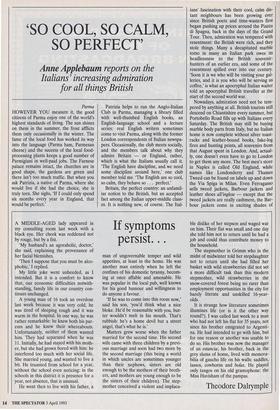If symptoms
persist. . .
A MIDDLE-AGED lady appeared in my consulting room last week with a black eye. Her cheek was reddened not by rouge, but by a fist.
`My husband's an agoraholic, doctor,' she said, explaining the provenance of her facial blemishes.
`Then I suppose that you must be alco- phobic,' I replied.
My little joke went unheeded, as I intended. But it is a comfort to know that, our economic difficulties notwith- standing, family life in our country con- tinues unchanged.
A young man of 16 took an overdose last week because it was very cold, he was tired of sleeping rough and it was warm in the hospital. In one way, he was rather remarkable: he knew both his par- ents and he knew their whereabouts. Unfortunately, neither of them wanted him. They had separated when he was 11. Initially, he had stayed with his moth- er, but she had grown bored with him: he interfered too much with her social life. She married young, and wanted to live a bit. He truanted from school for a year, without the school even noticing: in the schools in this district it is presence for a year, not absence, that is unusual.
He went then to live with his father, a man of ungovernable temper and wild appetites, at least in the home. He was another man entirely when he left the confines of his domestic tyranny, becom- ing at once affable and amenable. He was popular in the local pub, well known for his good humour and willingness to do anyone a favour.
`If he was to come into this room now,' said his son, 'you'd think what a nice bloke. He'd be reasonable with you, but- ter wouldn't melt in his mouth. That's rubbish: he's a home devil but a street angel, that's what he is.'
Matters grew worse when the father married for the second time. His second wife came with three children by a previ- ous marriage and soon had two more by the second marriage (this being a world in which uncles are sometimes younger than their nephews, sisters are old enough to be the mothers of their broth- ers, and mothers are young enough to be the sisters of their children). The step- mother conceived a violent and implaca- ble dislike of her stepson and waged war on him. Their flat was small and one day she told him not to return until he had a job and could thus contribute money to the household.
The stepmother in Grimm who in the midst of midwinter told her stepdaughter not to return until she had filled her basket with wild strawberries did not set a more difficult task than this modern stepmother, wild strawberries in the snow-covered forest being no rarer than employment opportunities in the city for barely literate and unskilled 16-year- olds.
It is strange how literature sometimes illumines life (or is it the other way round?). I was called last week to a man who had not left his flat for 35 years, not since his brother emigrated to Argenti- na. He had intended to go with him, but for one reason or another was unable to do so. His brother was now the manager of an estancia; his brother, back in the grey slums of home, lived with memora- bilia of gaucho life on his walls: saddles, lassos, cowhoms and bolas. He played only tangos on his old gramophone: the Miss Havisham of the pampas.
Theodore Dalrymple


















































 Previous page
Previous page